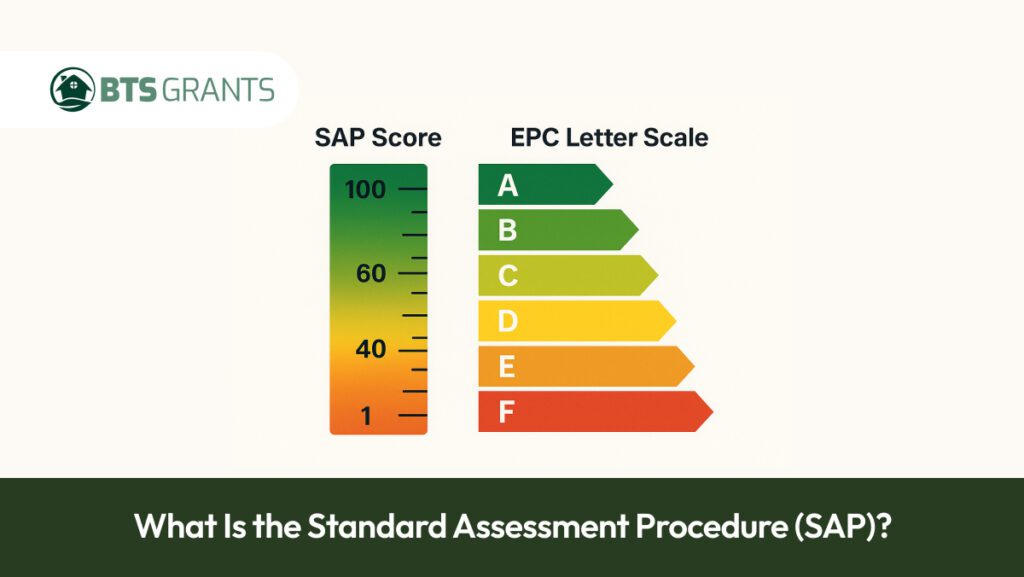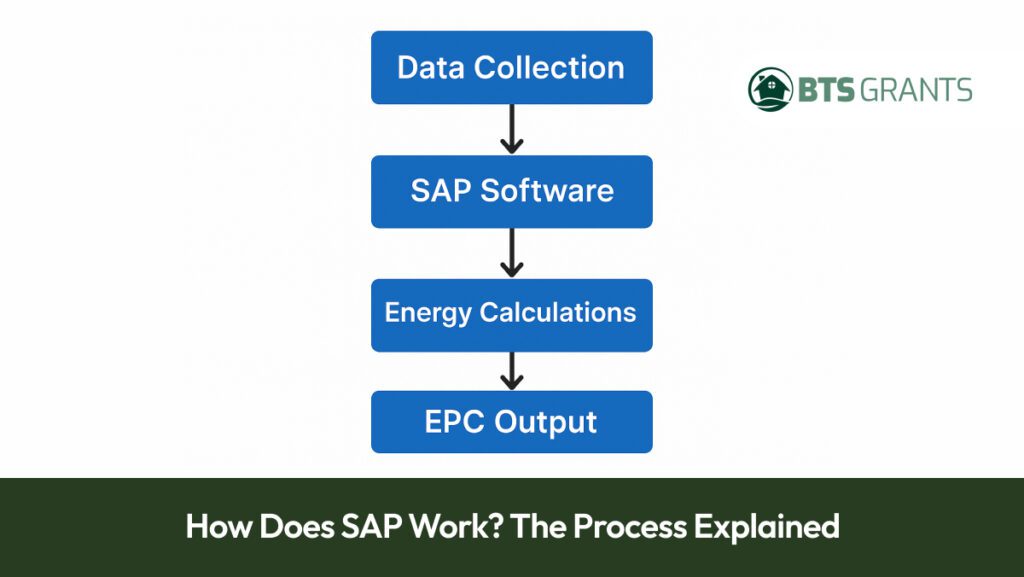When people talk about how well a building works, they often use the term SAP, which stands for the Standard Assessment Procedure. This is because the UK wants its homes to be more energy-efficient and environmentally friendly. But the question is, what is it, and why is it essential for the energy rating of your home?
Below, we discuss the Standard Assessment Procedure (SAP), why it’s important, and how it fits into your Energy Performance Certificate.
What SAP is and Why It Matters
The UK government’s official way to find out how energy-efficient homes are is the Standard Assessment Procedure. It tells you how much energy a home uses, how well it uses that energy, and how much CO₂ is being emitted.
New homes must have an SAP assessment, and some remodelled homes must too. The aim is straightforward: to make homes more environmentally friendly, reduce running costs, and lead to a reduction in emissions.
If you’ve ever wondered how your EPC rating is figured out, SAP is the answer.
What Is the Standard Assessment Procedure (SAP)?


SAP is a numerical system that scores a property based on its energy efficiency. It’s a government-approved standard, coming from the Department for Energy Security and Net Zero, formerly BEIS.
SAP ratings range from 1 to over 100, where:
- 100 or above means the property generates more energy than it uses (very efficient), and
- A low score means the home wastes more energy and costs more to heat.
These calculations form the foundation of your Energy Performance Certificate (EPC) — the coloured chart that shows your home’s energy rating from A (most efficient) to G (least efficient).
What Is a Standard Assessment Procedure Calculation?
An SAP calculation is a detailed calculation of the energy efficiency of your home. It is performed by a qualified SAP assessor using approved standard assessment procedure software.
They usually contemplate this:
- Construction materials and insulation — to figure out why heat is being lost.
- Heating and hot water systems — monitor their efficiency levels and controls.
- Ventilation systems — if natural or mechanical.
- Lighting and renewable energy systems — such as LED lighting or solar panels.
- Air leakage rates and fuel types — to determine efficiency.
Each of these elements affects your SAP rating, giving you a clear picture of how eco-friendly your property is.
Example:
A new house with solar panels and an air source heat pump that is well-insulated might get an 85 or higher, while an older house that isn’t well-insulated might get less than a 50.
How Does SAP Work? The Process Explained


The SAP process is systematic and data-driven. Here’s how it usually works:
- An SAP assessor gathers all the important information of a building: the design, insulation levels, heating systems, and lighting.
- The data is entered into the Standard Assessment Procedure software.
- The SAP rating is generated through detailed energy calculations performed by the software.
- This rating contributes directly towards the (EPC Energy performance certificate) for that property.
SAP software can simulate the energy moving through a property, identifying where improvements can and should be made to aid homeowners and builders in informed, energy-efficient choices.
SAP and EPC: How They Work Together
You could say that SAP is what makes the EPC work.
- The SAP assessment provides all the data and calculations.
- The EPC displays that data in a simple, easy-to-understand format (A to G rating).
Every newly built home in the UK must have a valid EPC, and SAP is how those figures are generated.
Anything that improves your SAP rating — such as upgrading insulation or changing to renewable heating — will automatically give you a better EPC rating, save you money on bills, and improve your property’s market value at the same time.
Who Performs an SAP Assessment?
An SAP assessor is a trained, accredited professional who is competent to perform calculations under the Standard Assessment Procedure. They use special software to undertake their calculations; the methods used are approved by the government.
These assessors often work with:
- Builders and developers of new homes.
- Homeowners who wish to implement significant modifications.
- Landlords and housing associations raise the bar for energy use.
Therefore, always employ an accredited SAP assessor who knows current regulations and recent modifications in software.
SAP Software and Training
These calculations are made via various government-approved software, including Elmhurst, Stroma, and Design SAP. Each of these platforms follows the UK’s building rules and uses one standard dataset to make sure the information is accurate.
An individual must enrol and complete the standard assessment procedure training to become an official assessor of SAP. This includes:
- Understanding the building regulations: Part L compliance.
- Learning how to use SAP software.
- Interpreting EPC data and sustainability reports.
This training ensures a certain quality and consistency of the energy assessments.
Why SAP Ratings Matter for Homeowners and Developers
Whether you’re a homeowner, landlord, or developer, your SAP rating is far more important than you might think. Here’s why:
- Lower energy bills: A higher SAP rating signifies that your property uses energy efficiently.
- Better compliance: In the UK, Building Regulations Part L must be followed.
- Higher property value: Homes that use less energy sell and rent out faster.
- Getting grants: Many programs, like ECO4 and the Boiler Upgrade Scheme, use EPC and SAP scores to decide who can apply.
At BTS Grants, we help homeowners and landlords improve their SAP ratings by making their homes more energy-efficient through upgrades such as new boilers, insulation, and central heating systems. Government-backed grants often finance these upgrades.
Useful Tips for Improving Your SAP Rating
It doesn’t have to be difficult to raise your SAP score. Here are some things you can do:
- Improving the insulation: Keep heat from escaping through walls, roofs, and floors.
- Install modern heating systems: Modern condensing boilers, heat pumps, and hybrid systems.
- Add renewable energy solutions: Solar panels or solar water heating systems increase your energy efficiency.
- Improve lighting efficiency: Replace old bulbs with LED lighting.
- Reduce air leakage: Gaps around windows and doors should be sealed to improve airtightness.
Your SAP rating can increase with even small changes, which will make your home more comfortable and cheaper to run.
Debunking Common SAP Myths
There are many myths about SAP. Let’s clear some common ones:
- Myth 1: “SAP is only important for new homes.”
Fact: SAP assessments are also needed for existing homes that are being completely remodelled. - Myth 2: “SAP ratings will never change.”
Fact: Adding insulation, heating systems, or renewable technologies will raise your score. - Myth 3: “SAP is mere paperwork.”
Fact: SAP provides you with useful information, which can help you save energy, reduce your bills, and lower your carbon emissions.
Understanding the truth about SAP enables householders to make appropriate decisions on how to make a house more energy-efficient.
The Future of Energy Efficiency with SAP
The Standard Assessment Procedure is crucial for the UK to achieve its net-zero target since it ensures that homes are built and designed in a manner that is energy-efficient and carbon-emission-reducing.
It’s not just about following the rules—understanding your SAP rating helps you build a home that’s cosy, efficient, and affordable. Whether you are looking to achieve a better SAP score for your home or upgrade your heating with government-backed funding, BTS Grants can guide you.
See if you qualify today, and take that first step towards a greener, more energy-efficient home.
FAQ‘S
An SAP rating measures how energy-efficient your home is; the higher the score, the lower your energy bills.
Assessment by a qualified and trained SAP assessor is carried out using approved software.
It gives predictions on how much energy a house will consume and just how much friendlier it is to the environment.
SAP is the way to figure out how energy-efficient your home is, while EPC is the certificate that shows how energy-efficient your home is.
You can improve the insulation, switch to more efficient heating systems, and use less energy.





